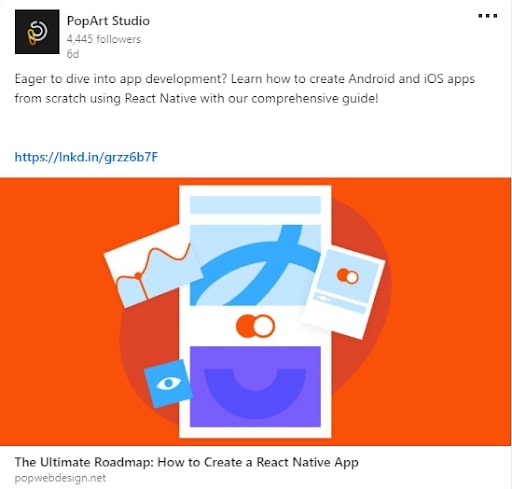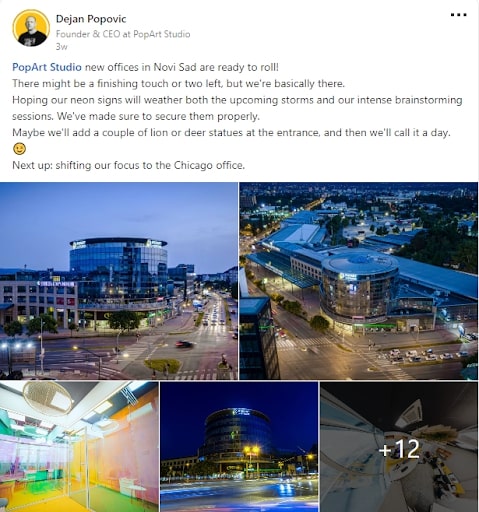In a world where businesses are clamoring for attention, it's no longer enough to plaster your brand across billboards and buses. With most eyes glued to their smartphones, those flashy ads often fade into the background noise of daily life. So, how do you cut through the clutter and introduce your brand to potential clients?
Enter B2B social media marketing—a powerful tool that goes beyond a few self-promotional posts each month. To truly engage this kind of professional audience, you must offer valuable insights and expertise, all while maintaining a relatable human touch.
Sprinkle in a dash of humor and a unique angle that sets you apart from the competition, and you’ve got a recipe for success. Let’s explore together how to develop a successful B2B social media marketing strategy.
What Is B2B Social Media Marketing and What Is Its Impact on Business
B2B social media marketing refers to the strategic use of social media platforms to promote products or services specifically from one business to another.
Unlike B2C (business-to-consumer) marketing, which focuses on appealing directly to individual customers, B2B marketing seeks to engage other businesses in a meaningful way. This often involves a longer process and a more nuanced approach, as businesses look for solutions that can enhance their operations, drive efficiency, or ultimately boost their bottom line.
By leveraging social media channels like LinkedIn, Twitter, and even Facebook, B2B marketers can create targeted campaigns that showcase their expertise, build credibility, and foster trust among potential business clients.
But why is B2B social media marketing so crucial for building lasting relationships? In today’s interconnected world, it’s not just about closing deals; it’s about nurturing connections that lead to long-term partnerships.
Social media allows businesses to share valuable insights, industry trends, and helpful resources that resonate with their audience. This engagement helps establish a brand’s authority and positions it as a go-to resource in its field, which is the only way to get to the decision-makers and business leaders.
When businesses communicate with authenticity and provide value, they transform transactional interactions into collaborative relationships, paving the way for mutual growth and success.
Crafting a Successful B2B Social Media Marketing Strategy
What is common with creating a successful B2B social media marketing strategy and any other, is that it begins with understanding your target audience, which in this case consists of business representatives.
While B2C marketing often relies on appealing to emotions and immediate gratification, B2B buyers are typically driven by logic and long-term value.
Begin by identifying key decision-makers within the businesses you want to reach and gather insights into their pain points, preferences, and interests. This research not only guides your content creation but also helps you identify opportunities within your competitors’ strategies.
Analyze what works well for them and pinpoint any gaps that you can exploit to differentiate your brand and provide additional value to your common audience.
Once you’ve mapped out your audience and competitive landscape, it’s essential to define your goals and objectives. Whether you aim to generate leads, boost brand awareness, or establish thought leadership in your industry, ensure your goals are specific, measurable, achievable, relevant, and time-bound (SMART).
With your objectives set, develop a content calendar that balances promotional posts with informative and engaging content, such as industry insights, case studies, and expert tips.
Utilize the power of hashtags when it comes to social media marketing. Remember, the “social” in social media is crucial — actively communicate with your audience, respond promptly to questions and feedback, and maintain an appropriate tone that reflects your brand’s personality.
By fostering genuine interactions and consistently delivering value, you’ll build a strong foundation for your B2B social media presence and cultivate lasting relationships with your audience.
How to Decide Which Social Media Platform Is Best for B2B Marketing?
Choosing the right social media platform for your B2B marketing strategy is also heavily influenced by your target audience. While LinkedIn is often the go-to choice for most B2B marketers due to its business-centric focus and professional networking capabilities, it’s important to consider your specific industry and the preferences of your audience.
For instance, if your target market consists of younger professionals or tech-savvy individuals, platforms like TikTok or X/Twitter might offer unique opportunities to engage them.
Similarly, leveraging YouTube for tutorials or podcasts can effectively showcase your expertise while catering to audiences who prefer video or audio content. Don’t overlook the power of Instagram for visually appealing content or Facebook for targeted ads and private groups that foster community interaction.
The key to making the best platform choice lies in understanding where your audience is most active and what type of content resonates with them. Take the time to research the demographics of various social media platforms.
By comparing these demographics with those of your target audience, you can identify which platforms are most frequently used by your potential clients.
Additionally, consider repurposing your content to maximize its reach. A single blog post can be transformed into an engaging video for YouTube, a series of eye-catching Instagram posts, or even a podcast episode. This approach not only saves time and resources but also ensures that your message is delivered across multiple channels, allowing you to connect with a broader audience.
By strategically selecting platforms and adapting your content, you can enhance your B2B marketing efforts and create a more dynamic online presence.
Effective B2B Marketing Social Media Examples
At PopArt Studio, we leverage various social media platforms, each with tailored approaches, to nurture our relationships with existing clients while actively seeking to connect with potential new ones.
We achieve this by experimenting with different tactics and analyzing which ones resonate best with our audience.
The three main strategies we find most effective include:
1. Establishing Your Brand as a Thought Leader through Educational Content
Consistently producing relevant educational blogs, researching trending industry topics, and offering expert insights not only positions your brand as a valuable resource but also keeps your audience engaged. Sharing these informative blogs on LinkedIn is particularly well-received and helps reinforce your authority in the field.

2. Empowering Employees as Your Brand’s Authentic Voice
When your CEO or other key team members share exciting company news, it fosters a personal connection that corporate posts often lack. This authentic approach allows other company representatives to relate more easily and strengthens your brand’s credibility.

3. Keeping It Human
Remember, you’re communicating with real people, not just faceless institutions. Incorporating less formal posts that showcase behind-the-scenes moments and highlight your team’s personality can foster genuine connections and create a more relatable brand image.

Measuring the Success of Your B2B Social Media Marketing Efforts
You wouldn’t bake a delicious pie without checking how the process is going, would you? Tracking your performance is essential for staying on track—and reaching your goals.
Fortunately, all social media channels come equipped with their own analytics tools, allowing you to keep an eye on impressions, engagement rates, and overall performance. By diving into this data, you can evaluate your KPIs and plan your next steps like a strategic navigator.
For an effective content calendar that drives leads and establishes connections, it’s crucial to understand what type of content hits the mark and what falls flat.
With this knowledge in hand, you can refine your approach, ensuring that every post serves a purpose and contributes to your overarching marketing goals. So, don’t just post and ghost – use those analytics to set your strategy at the right temperature!
Bonus Tip: Leverage the Power of Influencer Marketing
In the world of B2B marketing, leveraging influencer partnerships can significantly affect your brand’s visibility and credibility. Influencers today have cultivated wide audiences that trust their opinions and recommendations.
By collaborating with the right influencer – someone who holds respect in your industry and resonates with your target audience – you can tap into their established credibility and amplify your reach.
This strategy not only boosts your chances of attracting new customers but also positions your brand as a trusted authority in your field.
Choose influencers who align with your values and have a genuine understanding of your services, as their endorsement can pave the way for meaningful connections and foster trust among potential clients.
You Don’t Have to Do It All Alone – But You Do Have to Do It
In today’s business environment, social media has evolved into a crucial element for B2B success, and its significance is poised to increase even further with future social media development.
According to Backlinko’s recent statistics, 90% of B2B marketers have distributed content on social media platforms in the past year, making it the most widely used distribution channel.
Moreover, social media ranks as the most effective channel for achieving both top-of-funnel and bottom-of-funnel goals, highlighting its versatility in driving engagement and conversions.
If managing your social media presence feels overwhelming, remember that you don’t have to do it alone. Statistics also reveal that many companies (as many as half of them!) are opting to outsource their B2B marketing activities.
You can always choose the route of digital marketing services tailored to your needs, so you can focus on running your business while social media experts help you navigate the world of marketing.





